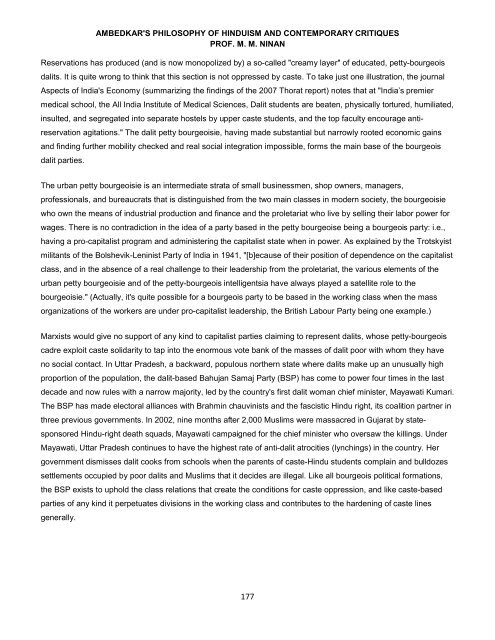Ambedkar-Philosophy of Hinduism
You also want an ePaper? Increase the reach of your titles
YUMPU automatically turns print PDFs into web optimized ePapers that Google loves.
AMBEDKAR'S PHILOSOPHY OF HINDUISM AND CONTEMPORARY CRITIQUES<br />
PROF. M. M. NINAN<br />
Reservations has produced (and is now monopolized by) a so-called "creamy layer" <strong>of</strong> educated, petty-bourgeois<br />
dalits. It is quite wrong to think that this section is not oppressed by caste. To take just one illustration, the journal<br />
Aspects <strong>of</strong> India's Economy (summarizing the findings <strong>of</strong> the 2007 Thorat report) notes that at "India’s premier<br />
medical school, the All India Institute <strong>of</strong> Medical Sciences, Dalit students are beaten, physically tortured, humiliated,<br />
insulted, and segregated into separate hostels by upper caste students, and the top faculty encourage antireservation<br />
agitations." The dalit petty bourgeoisie, having made substantial but narrowly rooted economic gains<br />
and finding further mobility checked and real social integration impossible, forms the main base <strong>of</strong> the bourgeois<br />
dalit parties.<br />
The urban petty bourgeoisie is an intermediate strata <strong>of</strong> small businessmen, shop owners, managers,<br />
pr<strong>of</strong>essionals, and bureaucrats that is distinguished from the two main classes in modern society, the bourgeoisie<br />
who own the means <strong>of</strong> industrial production and finance and the proletariat who live by selling their labor power for<br />
wages. There is no contradiction in the idea <strong>of</strong> a party based in the petty bourgeoise being a bourgeois party: i.e.,<br />
having a pro-capitalist program and administering the capitalist state when in power. As explained by the Trotskyist<br />
militants <strong>of</strong> the Bolshevik-Leninist Party <strong>of</strong> India in 1941, "[b]ecause <strong>of</strong> their position <strong>of</strong> dependence on the capitalist<br />
class, and in the absence <strong>of</strong> a real challenge to their leadership from the proletariat, the various elements <strong>of</strong> the<br />
urban petty bourgeoisie and <strong>of</strong> the petty-bourgeois intelligentsia have always played a satellite role to the<br />
bourgeoisie." (Actually, it's quite possible for a bourgeois party to be based in the working class when the mass<br />
organizations <strong>of</strong> the workers are under pro-capitalist leadership, the British Labour Party being one example.)<br />
Marxists would give no support <strong>of</strong> any kind to capitalist parties claiming to represent dalits, whose petty-bourgeois<br />
cadre exploit caste solidarity to tap into the enormous vote bank <strong>of</strong> the masses <strong>of</strong> dalit poor with whom they have<br />
no social contact. In Uttar Pradesh, a backward, populous northern state where dalits make up an unusually high<br />
proportion <strong>of</strong> the population, the dalit-based Bahujan Samaj Party (BSP) has come to power four times in the last<br />
decade and now rules with a narrow majority, led by the country's first dalit woman chief minister, Mayawati Kumari.<br />
The BSP has made electoral alliances with Brahmin chauvinists and the fascistic Hindu right, its coalition partner in<br />
three previous governments. In 2002, nine months after 2,000 Muslims were massacred in Gujarat by statesponsored<br />
Hindu-right death squads, Mayawati campaigned for the chief minister who oversaw the killings. Under<br />
Mayawati, Uttar Pradesh continues to have the highest rate <strong>of</strong> anti-dalit atrocities (lynchings) in the country. Her<br />
government dismisses dalit cooks from schools when the parents <strong>of</strong> caste-Hindu students complain and bulldozes<br />
settlements occupied by poor dalits and Muslims that it decides are illegal. Like all bourgeois political formations,<br />
the BSP exists to uphold the class relations that create the conditions for caste oppression, and like caste-based<br />
parties <strong>of</strong> any kind it perpetuates divisions in the working class and contributes to the hardening <strong>of</strong> caste lines<br />
generally.<br />
177


















